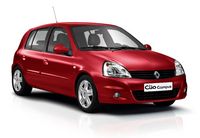New Renault Clio Campus: Access To The Clio Family
PARIS, FRANCE - April 15, 2009: Clio Campus continues its European career with this month's launch of the very latest version of the model. Since 2005, it has sat alongside New Renault Clio in the range and sold in 22 countries, winning over almost 400,000 customers in Europe alone. In 2008, Clio Campus' leading markets were France (40%), Italy (12%), Algeria (8%), Germany (7%) and Spain (6%). Buyers are attracted by the values championed by the Renault brand and seek a reliable car with low purchase and running costs. They will continue to find these selfsame qualities in the latest-generation version which features even more attractive styling.
In recent months, the European market has been influenced by two factors which have boosted sales of A/B-segment cars:
Renault is ideally positioned to respond to this shift in the market thanks to its particularly comprehensive range of compact models.
The next generation of Clio Campus will be will be released for sale from June (depending on country). In addition to its chief European markets, New Clio Campus will also be available in Algeria and Tunisia. It will be known as Clio Campus or Clio Storia according to the countries where it is marketed.
New front-end styling:
New Clio Campus features a new visual
identity, with Renault's design team building on the original design which
has proved so popular with customers to give it a more modern and more
dynamic feel. The redesigned front bumper and grille have been redesigned.
The trihedral panel behind the logo has been dropped and the bottom air
intake has been modified to highlight the front end's personality. The
juxtaposition of curves and horizontal lines adds a distinctly elegant
note, while the foglamps are now incorporated in the bumper and crystal
headlamp masks have been added. The decorative black B-pillar trimming
gives a more harmonious, flowing aspect to the sweep of the side windows.
New Clio Campus is equipped with new flatblade-type windscreen-wipers, and
the bigger exterior mirrors not only minimize blind spots but also comply
with current rear view legislation. Dynamique versions come with
body-colour exterior door handles, exterior mirrors and rear hatch trim,
with 15-inch Alyum aluminium alloy wheels and metallic paint available as
options.
Sportier upholstery:
New cloth upholstery with a black and
silver interwoven pattern has been introduced for the most
extensively-equipped level's sporty bucket seats. The lateral air-vents,
speedometer, rev-counter, gearlever, handbrake and interior door handles
are picked out in satin-finish chrome paint, while the instrument needles
are red.
Two petrol
engines, two diesel engines and one LPG engine (depending on markets) :
The New Clio Campus range includes a line-up of small capacity engines
which all deliver responsive performance and fuel efficiency.
An economical, ecologically friendly vehicle:
All the
different versions of New Clio Campus comply with the three criteria
required to qualify for the Renault eco signature. The two dCi versions are
eligible for the French state's eco-bonus of €700, while the LPG
version qualifies for the special €2,000 eco-bonus. FUNDAMENTAL
STRENGTHS New Clio Campus packs the same strengths as Clio Campus.
Incontestable quality and reliability
Like all the models
which make up Renault's small car range, New Clio Campus offers best-level
quality and reliability. As a model, it has come of age and its robustness
and build-quality have long been widely praised. New Clio Campus benefits
from the vast experience and expertise Renault has gained with Clio II
since 1998 and incorporates the very latest design standards applied by the
brand to all new projects.
A compact, versatile hatchback
New Clio Campus is built on
the same proven platform which has been so highly acclaimed since the
introduction of Clio II in 1998, and today still with New Twingo since
2007. This platform delivers a first class compromise between comfort and
dynamic performance, and enables Clio Campus to stand out as a truly
versatile hatchback. Thanks to its length of 3.81m and its turning circle
of 10.3m, New Clio Campus is particularly nimble and versatile, and as much
at home in and about town as it is on longer rides or along country roads.
The quality of its suspension and the comfort of its seats make long
journeys a pleasurable experience, and this sense of reassuring driving
enjoyment is further heightened by the smooth performance of its
powertrains. Clio Campus sits between Twingo (length: 3.60m) and Clio III
(4.03m) in the Renault line-up and stands out as the range's most compact
five-door hatchback.
Best-level running costs:
The engines which have been
selected for the range, along with its small size and contained weight,
ensure that New Clio Campus is particularly fuel efficient. Thanks to the
fitment of 14-inch tyres and widely-spaced servicing intervals (every two
years/30,000km for petrol versions, or every year/30,000km for diesel
versions), maintenance costs are very affordable.
A high standard of active and passive safety:
Clio II became
the first vehicle to secure a four-star EuroNCAP crash test rating in 2001,
proof that the platform on which it is based has active and passive safety
built in to its DNA. ABS, emergency brake assist and adaptive front airbags
are standard equipment, while New Clio Campus's safety credentials can be
further enhanced by optional lateral head/thorax airbags.
Production is split between Flins (France)and Novo Mesto (Slovenia)
The principal production site for New Clio Campus continues to
be the Novo Mesto plant in Slovenia. In parallel, the factory in Flins,
France, will take onboard a proportion of New Clio Campus production
alongside New Clio (approximately 8,000 cars between June and October
2009). This will enable Novo Mesto to increase Twingo production in
response to the strong growth in demand for this model across Europe.
Twingo sales have been increasing consistently over the past year, but
recently marked a sharp upturn following the introduction of 'trade-in for
scrap' schemes in many European countries.



